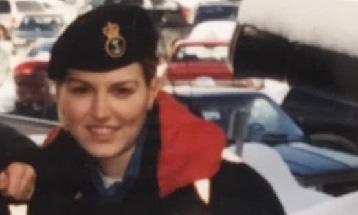Sharing lessons learned

Jeff and Tammy Casey, 2022.
Born the youngest of four children in Pugwash, Nova Scotia, Jeff Casey describes himself as an outdoors person. “I’ve been hunting and fishing since I was knee-high to a grasshopper,” he remembers.
He joined the Army Cadets while in high school. He loved the camaraderie and the outdoor activities, but a trip to a military base left a deep impression. “We got to go to Gagetown and see all the cool stuff,” he says. “I loved seeing the Leopard 2 tanks. I wanted to drive one since I was 14.”
After high school, Jeff applied to join the Canadian Armed Forces. Five years later, in 1996, the Royal Canadian Navy accepted him. “It was a secure job at a time when I had been laid off, I had a son (Brandon) who was one-and-a-half years old, a family to support and a house to pay for.”
Jeff began his Naval career as a sonar operator on the HMCS Fredericton in 1997. The “Freddy” took Jeff across oceans and around the world, including Expo 98 in Lisbon, Portugal.
Aboard the HMCS Preserver, Jeff had his first major injury when he fell into a rigid-hulled inflatable boat. “I was 24 years old and felt bulletproof,” he says. The back and knee injuries he suffered would come back to haunt him years later.
Jeff’s role as sonar operator wasn’t his preferred choice of trade. “It wasn’t me: sitting at a screen all day, tracking submarines.” Jeff released from the Navy in 1999, but soon missed it and rejoined after six months. This time, he selected the trade he had wanted in the first place: electrician. “I had learned a lot of things. For example, that I could say ‘no.’”
He was deployed on the HMCS Halifax. The frigate was near Scotland when the crew learned of the September 11, 2001, terrorist attacks on the United States. “We thought at first that it was an exercise.”
By the end of October 2001, the Halifax was in the Persian Gulf, escorting other ships. “It was a tense and exciting time,” Jeff says. “It felt real.” However, being away from his family that Christmas season was difficult.
Jeff served on the Halifax until 2005, then took a security training course. In 2010, he was working as an airfield security officer in Kandahar, Afghanistan. “It was different. First of all, it wasn’t a ship. It seemed to be a mundane job when I volunteered for it.” Even with daily rocket attacks. “You got used to them.”

Master Seaman (Retired) Jeff Casey standing in front of a helicopter.
But a night attack on the Kandahar base in May 2010 contributed to mental and emotional injuries that Jeff would carry for years. After six months, Jeff rotated out of Afghanistan.
In 2012, he was back on the HMCS Halifax, promoted to Petty Officer, Second Class, as an Integrated Machine Control System (IMCS) technician.
By 2016, after service of 19 years and 100 days, Jeff medically released from the CAF with back and knee injuries and PTSD symptoms stemming partly from the experience in Kandahar. “I was a mess,” Jeff says of the time. “It affected my family life.”
His living conditions didn’t help, as he rented a room in Halifax to be close to work while his family lived two hours away in Port Howe, NS.
Jeff found transition difficult. “I was angry when I released medically—angry about the way I was treated. One coxswain told me ‘The Navy doesn’t want people like you.’”
“I felt like I lost my identity when I was medically released.”
“Because of my back and knee injuries, I couldn’t find work in construction. It was devastating—I had worked all my life.” Characteristically, Jeff took the solution into his own hands. He bought a small sawmill, cutting lumber more for therapy than anything else. “Life is more enjoyable now.”
Jeff looked for mental health support from professionals at the Stadacona base in Halifax. He credits an “awesome case manager” with putting him in touch with VAC services.
To help himself and others with PTSD, Jeff started a support group, which he called “Coffee Talk.” It’s an informal gathering in the evening where Veterans of the CAF, corrections officers, police force members and others can share experiences and resources. “It’s good to have someone hear their voice.” Jeff offers the lessons he has learned from service and transition, such as self-advocating and navigating the system.
Jeff turned to an organization called Challenge Factory for help. With funding from VAC’s Veteran and Family Well-Being Fund, Challenge Factory helps match the needs of small and medium-sized businesses with the skills and talent of Veterans. Jeff wasn’t looking for a new job himself, but wanted to learn more so he could help other Veterans.
“Every Veteran is different. We have a lot of skills and experience to offer.”
Jeff Casey’s transition tips
- Ask for help. Don’t think you’re invincible, and don’t think issues are a sign of weakness.
- When it comes to delays in getting answers or access to services and benefits, don’t take them personally. Complicated health decisions can take time.
- Advocate for yourself.
- Put anger aside; remain calm and communicate clearly.
- Do your research into all the opportunities out there through VAC, OSISS and peer support.
- Put your own mental health and recovery first. If you want to help others, make sure it doesn’t jeopardize your own mental health and recovery.
You can find information on transition services on the Transition page on VAC’s website.



